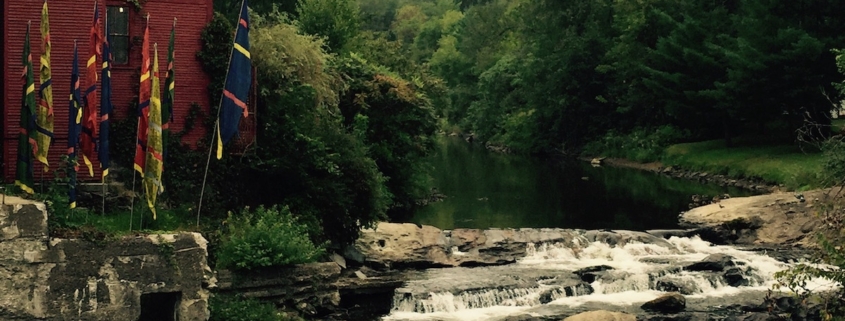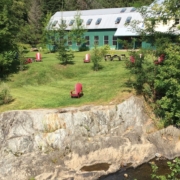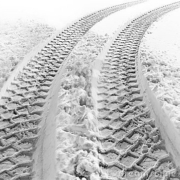In Search of the Unknown
I’ve just completed a writing residency at the Vermont Studio Center, a two-week get-away in Northern Vermont, where I lived in a community with approximately fifty visual artists and twelve writers. I found inspiration in the work of other visual artists, despite the fact that I wasn’t there for art, and I ended up in the quaint art store at Main and Pearl more times than I can count.
The best moments were found beside the Gihon River, where water rushing over rock lulled me into a heightened imaginative state so that whole chapters emerged easily on paper. Despite the pristine condition of the writing studios, I found that the organic experience of sitting outdoors and writing longhand – pen to paper—to be the most cathartic.
It took a few days to settle in (See Giving Myself Permission NOT to Write), but eventually I found a rhythm and a commitment that had been eluding me at home. A rhythm and commitment that I hope will remain now that I’ve returned to Virginia.
The visiting writer in residence, Ron Carlson, was a generous, master teacher (he started teaching in 1969!). The one-on-one workshop was a positive experience and I’m looking forward to revising the short story we discussed. Some of the tidbits from his group workshop I found most helpful:
- Survive the Draft (that’s your main goal when writing the novel)
- Write into the Dark—trust the ambiguity of the draft.
- We read in the light, story already complete and understood by the reader, but we write in the dark, where there is mystery and the unknown.
- Aim for 750-1500 words a day. Write first thing in the morning before the real world intrudes, before you even get dressed or brush your teeth (he concedes that coffee is acceptable).
Ruth Ozeki says writing the first draft of a novel is like “shoveling cement.” Ron Carlson says write it in the dark and aim to survive it. Rebecca Solnit says, “Certainly for artists of all stripes, the unknown, the idea or the form or the tale, that has not arrived, is what must be found. It is the job of all artists to open doors and invite in prophesies, the unknown, the unfamiliar; it’s where their work comes from, although its arrival signals the beginning of the long disciplined process of making it their own….artists get you out into that dark sea.”
During my residency, I wrote furiously, not censoring, not excessively editing, just writing content in the dark, adrift in the dark sea while in search of the unknown. There were times when I wondered if I was getting anywhere, if the magic would happen. And then there was that moment when I pushed through a scene, blindly, intuitively, and I arrived at a critical juncture, a juncture that I hadn’t yet envisioned, and I had that a-ha moment, even as my words tumbled on to the page, practically unbidden. It was a heart-racing, cry-out-loud, magical moment.
I’m surviving the draft of my novel, and my arms and hands are tired from all of the cement shoveling, from all of the rowing into the deep, dark sea in search of the tale, but I’m also experiencing a bit of magic, and my time in Vermont, sitting beside the Gihon River may just have contributed to that. Let the magic continue.



